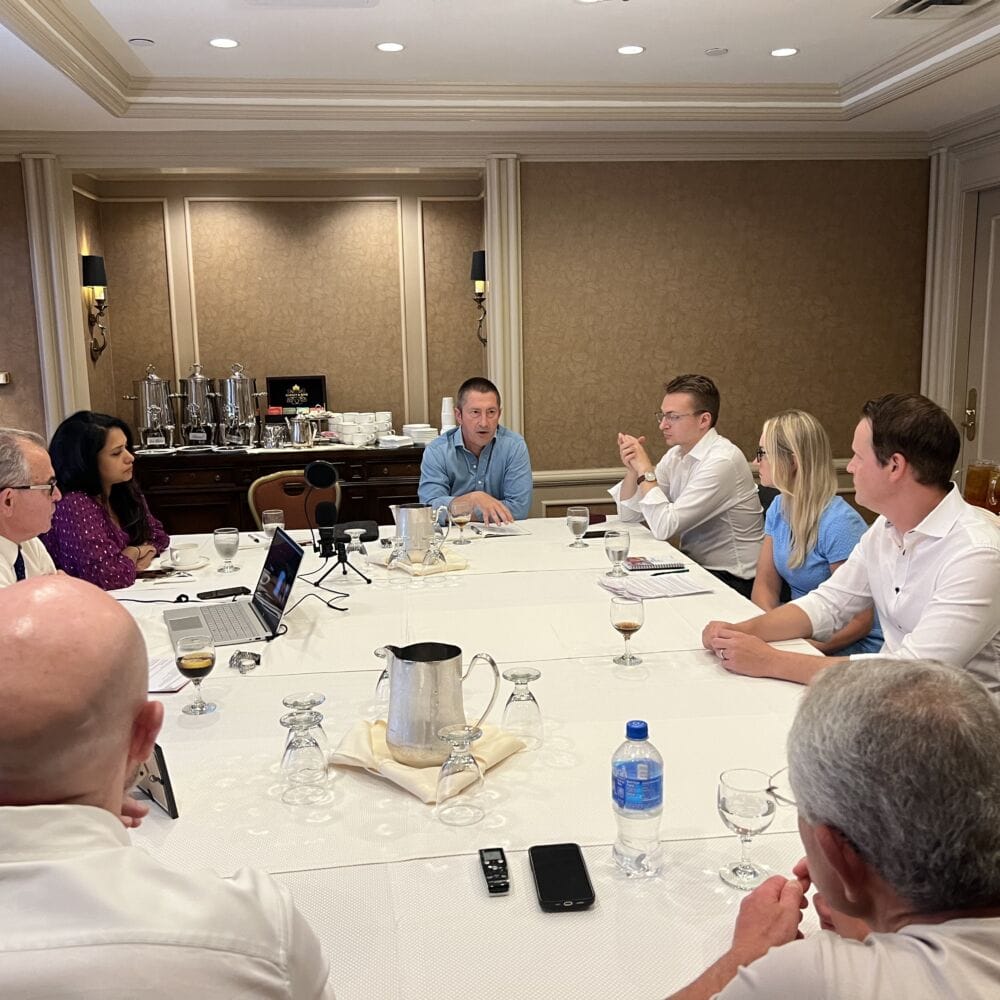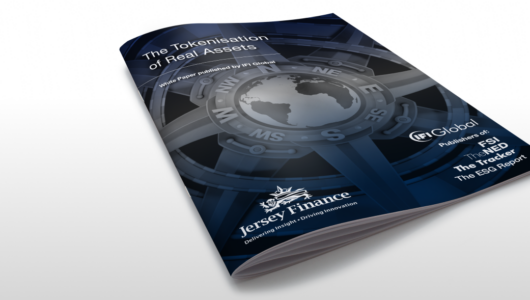US Managers Capital Raising Overseas – Roundtable Highlights
In July, Jersey Finance partnered with IFI Global on a roundtable discussion in New York. It focussed on what is driving US managers to go overseas. The following is a summary of the discussions at the roundtable.
Attending the roundtable were:
Marta Ciemiega (MC), Crestbridge
Guy Dominy (GD), Ogier
Ian Flavell (IF), Rede Partners
Ashley Groves (AG), Deaglo
Jake Heyka (JH), SRZ
Simon Osborn (SO), IFI Global
Philip Pirecki (PP), Jersey Finance
Elliot Refson (EF), Jersey Finance
Jay Remillard (JR), CP Capital
Why US Managers go Overseas to Raise Capital
IF: We work with private equity and private credit groups. The first fund that they launch is often for US investors. But as they progress through their lifecycle, and raise larger funds as well as becoming more institutionalised, it is natural for them to look beyond the US. Europe is very often their first port of call.
For the large, well-established managers we see approximately 30% of their capital coming from Europe. Fund raising is challenging at the moment, particularly with the largest LPs in North America, such as the major pension funds, being so constrained. As a result, we are seeing a growing appetite for GPs in the US to look overseas. There are pockets of capital in Europe which are pretty liquid and are growing.
We put out a survey twice a year called the Rede Liquidity Index. It is a barometer of liquidity for investors in private markets, looking at institutional investor sentiment towards private market fundraising, and the latest survey showed European LPs as having relatively more liquidity than those in North America.
PP: We have noticed that US managers are looking to raise capital overseas earlier and earlier in their lifecycle.
JR: We have been working largely with German high net worth investors. We find that overseas investors, when they come to the US, like to allocate through a trusted fund manager. US investors, on the other hand, are more likely to go with contacts that they already have. As a result, we often feel that that we are more useful to overseas investors than those in the US.
AG: Currency risk is an important factor for US managers to consider. In the past, hedging currency risk often seemed impractical due to high costs, extreme currency volatility, and illiquid markets. However, the landscape has evolved, and now, factoring in currency risk holds crucial significance for US managers. Moreover, given the shifting interest rate environment, embracing hedging strategies has become a prudent choice. As the quest for capital turns fiercer and US managers seek foreign limited partners or overseas investments, the realm of foreign exchange can’t be ignored.
US managers now confront the task of devising comprehensive FX risk management throughout their investment lifecycle, which typically spans three to seven years.
We've noticed that US managers are looking to raise capital overseas earlier and earlier in their lifecycle.

Jersey Finance Lead in the Americas
Why US managers often look at Europe when raising capital overseas
JR: Where US managers go to raise assets overseas is often governed by cultural factors as well as by the rules and regulations.
GD: The jurisdiction of the underlying asset also plays an important role as to where US managers will seek to raise capital. European investors will likely be more comfortable with managers from the US raising a European fund to buy local assets than perhaps other structures.
JH: Cultural factors tend to come into play more in the high net worth market rather than the institutional one. If a US manager is raising capital from US high net worth investors then they will very likely look to their equivalents in Europe. Pension plans, on the other hand, tend to look for larger, well-established funds for their asset allocation than those operating in the high-net-worth market.
MC: There is certainly room for US managers to grow in Europe as pension funds there are looking outside their own region, and they tend to write big cheques. The Japanese Government Pension Investment Fund (GPIF) is the largest one in the world but two European pension plans, Norges and ABP, are in the world’s top 10. Large European pension plans want to diversify – by geography as well as by asset class.
ER: It is important to remember that the two largest markets in Europe for US managers are not part of the EU: the UK and Switzerland. According to statistics from the EU, only three percent of managers market into more than three EU countries – and when this study was done the UK was still in the EU. Jersey has an AIFMD opt in and opt out regime for managers. If you are not marketing into the EU, and so outside of AIFMD’s scope, you do not have to comply with the Directive. And if you are targeting just one or two European countries you can use private placement. However, if you domicile in say Ireland or Luxembourg, you have to be fully AIFMD compliant, including with the Directive’s remuneration provisions, which US managers often do not like.
IF: We advise our clients that it will take them longer to do business in Europe than in the US. The regulatory environment is one reason for this and the familiarity aspect of it all is another one, with European LPs being generally less familiar with the US landscape. So, the earlier in the process managers can do this the better. Also, when managers are off cycle, and don’t have a fund to sell, they are not so constrained regarding registering for marketing or premarketing. This allows them to have brand building conversations and get an idea of where there might be opportunities to raise capital across Europe.

PP: Sometimes US managers are not sure which European markets they should focus upon when they first decide that they want to raise capital in this region. Many US managers find that they end up looking at a few markets only, rather than the region as a whole. And they also find that the process can take longer, and be more expensive, than they had originally envisaged.
JR: There is a nervousness in Europe at the moment which is in part caused by the war in Ukraine as well as the challenging macro-economic environment. This is stimulating investment into the US where some Europeans may feel that their money will be safer.
AG: Latin American managers pivot towards major funding regions, predominantly the US and Europe. As they grow beyond a certain scale, they inevitably shift their focus towards international investors, surpassing their local market confines.
What are the challenges of raising capital in Europe and how do US managers deal with these challenges?
MC: European investors are generally more risk averse. They tend to look for reasons to turn down an investment opportunity until they feel really comfortable. The whole process can take much longer in Europe than in the US.
JR: We are going with private placement as we expand around the world. We will talk to any potential investor but we would prefer that they come to us pre-vetted, and with some familiarity with what we do. Private placement allows us to have higher quality and legally safer conversations.
IF: Most managers we work with use private placement. You should have an expectation of raising an awful lot of capital in Europe to go all the way and become fully regulated under AIFMD. Reverse solicitation is obviously not a marketing strategy. But if you are a small emerging manager who ends up with one European investor then it is less likely to be an issue than it would be for a large multi-billion manager with many European investors.
PP: Changes to the pre-marketing rules have had an impact on reverse solicitation. Although managers haven’t generally been taken to task for breaking reverse solicitation rules the penalties for violation of the rules are criminal. Private placement is a much safer option.
GD: Besides the threat of criminal liability for noncompliance with the AIFMD marketing provisions, managers are giving investors that they have through reverse solicitation the opportunity to get out of the fund, and have their money returned, if those investors don’t like the performance.
NV: Going casually into any market is not a good idea and one should have the right team to navigate the landscape. There are a lot of investors looking to fund globally in part because of the liquidity crunch in the US and also because other countries have a more developed scheme in certain sectors than in the US. Take for example, ESGs in Europe which are more developed than in the US, and are a great source of funding for those seeking investment opportunities.
AG: Nurturing local expertise holds immense significance. Aligning with individuals who share the same investor-oriented education and preferences proves immensely beneficial. The art of networking has transcended into a make-or-break factor in investments, underscoring the pivotal role of expertise.
According to statistics from the EU, only two percent of managers market into more than three EU countries.

Head of Funds, Jersey Finance
Will there be many more US managers coming to Europe in three years’ time, or will the situation be similar to today?
NV: I think significantly more because (i) the US is in a liquidity crunch (rising interest rates and general uncertainty in the market), (ii) we are a global economy, (iii) its normal to go where the money and opportunities are, and (iv) we have seen sought out and found opportunities in Europe as a necessity during and after the pandemic and that will just continue and grow.
PP: The trend is clear. It is difficult to forecast how much more over a certain period of time. But in Jersey there is certainly a significant year on year increase in US managers using the jurisdiction to access European investors. We are seeing US managers coming over to Europe at an earlier stage in their development.


MC: Yes, there will be more. And I wonder whether the profile of the investors will change. With the democratisation of private equity there is certainly appetite. Don’t forget that there are 450 million people in Europe, it is a large market.
IF: We expect that there will be more. It is a longstanding trend.
JR: I think that there will be significantly more. There is so much competition in the pension and endowment markets in the US and to raise capital that you must look globally. That helps build your overall fund size and then you can come back to the US and talk to the largest allocators.
JH: I think that there will slightly more in three years but not necessarily a lot more. I am not confident that we will have got out of the prohibitive regulatory environment by then.
GD: There will be more. The war in Ukraine and the recessionary environment in Europe will continue to put pressure on European asset values and present opportunities. European investors will also be interested in looking at opportunities elsewhere, including in the US.
ER: We are seeing year on year growth in Jersey of funds established by US managers for the European market.
This summary of the roundtable discussion was produced by IFI Global.



